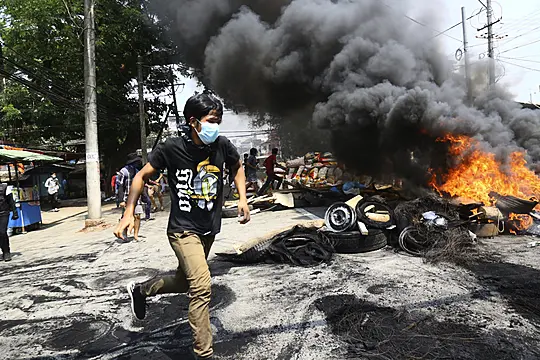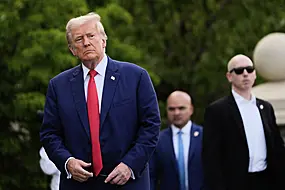Myanmar security forces opened fire on a crowd attending the funeral of student who was killed on the bloodiest day yet of a crackdown on protests against last month’s coup, local media reported.
The escalating violence — which took the lives of at least 114 people on Saturday including several children — has prompted a UN human rights expert to accuse the junta of committing “mass murder” and to criticise the international community for not doing enough to stop it.
The Security Council is likely to hold closed consultations on the escalating situation in Myanmar, UN diplomats said on Sunday, speaking on condition of anonymity ahead of an official announcement.
The council has condemned the violence and called for a restoration of democracy but has not yet considered possible sanctions against the military, which would require support or an abstention by Myanmar’s neighbour and friend China.

The mounting death tolls have not stopped the demonstrations against the February 1 takeover — or the violent response to them from the military and police.
Myanmar Now reported the junta’s troops on Sunday shot at mourners at the funeral in the city of Bago for Thae Maung Maung, a 20-year-old killed on Saturday. He was reportedly a member of the All Burma Federation of Student Union, which has a long history of supporting pro-democracy movements in the country.
According to the report, several people attending the funeral were arrested. It did not say if anyone was hurt or killed. But at least nine people were killed elsewhere on Sunday as the crackdown continued, according to the Assistance Association for Political Prisoners (AAPP), which has been documenting deaths during demonstrations against the coup.
Some of the funerals held on Sunday themselves became opportunities to demonstrate resistance to the junta.
At one in Bhamo in the northern state of Kachin, a large crowd chanted democracy slogans and raised the three-finger salute that has come to symbolise defiance of the takeover. Family and friends were paying their respects to Shwe Myint, a 36-year-old shot dead by security forces on Saturday.

The military had initially seized her body and refused to return it until her family signed a statement that her death was not caused by them, according to the Democratic Voice of Burma, a broadcast and online news service.
In Yangon, the country’s largest city, meanwhile, mourners flashed the three-finger salute as they wheeled the coffin of a 13-year-old boy. Sai Wai Yan was shot dead by security forces as he played outside his home.
The February 1 coup that ousted Aung San Suu Kyi’s elected government reversed years of progress toward democracy after five decades of military rule.
It has again made Myanmar the focus of international scrutiny as security forces have repeatedly fired into crowds of protesters. At least 459 people have been killed since the takeover, according to the AAPP.
The crackdown extends beyond the demonstrations. Humanitarian workers reported the military had carried out airstrikes on Sunday against guerrilla fighters in the eastern part of the country.
Henrietta Fore, head of the UN children’s agency UNICEF, said in Saturday’s bloodiest day since the coup “an 11-year-old boy, an 11-year-old girl, two 13-year-old boys, a 13-year-old girl, three 16-year-old boys and two 17-year-old boys, (were) all reportedly shot and killed”. She said a 12-month old baby girl was gravely injured after being struck in the eye with a rubber bullet.
“In less than two months, at least 35 children have allegedly been killed, countless others seriously injured and almost 1,000 children and young people reported arbitrarily detained by security forces across the country” she said, condemning the indiscriminate killings and demanding that those responsible be held accountable.
The junta has accused some of the demonstrators of perpetrating the violence because of their sporadic use of Molotov cocktails and has said its use of force has been justified to stop what it has called rioting.

While protesters have occasionally hurled firecrackers at troops and on Saturday carried bows and arrows, they remain vastly outgunned and have shown commitment to methods of nonviolent civil disobedience.
Saturday’s death toll far exceeded the previous single-day high that ranged from 74 to 90 on March 14. The killings happened throughout the country as Myanmar’s military celebrated the annual Armed Forces Day holiday with a parade in the country’s capital, Naypyitaw.
“Today the junta of Myanmar has made Armed Forces Day a day of infamy with the massacre of men, women and very young children throughout country,” said Tom Andrews, the UN’s independent expert on human rights for Myanmar.
“Words of condemnation or concern are frankly ringing hollow to the people of Myanmar while the military junta commits mass murder against them. It is past time for robust, coordinated action.”







